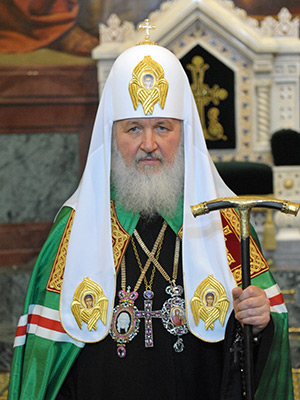Ukraine: Russian Patriarch plays intricate political game in letter to Putin and Poroshenko

The head of the Russian Orthodox Church (ROC) has made an impassioned call for peace in Ukraine in the face of continuing violence there.
Patriarch Kirill has written to Russia's President Vladimir Putin and Ukraine's President Petro Poroshenko calling for renewed efforts toward peace.
Referring to the agreement which was intended to end hostilities between the government and pro-Russian rebels, he said: "The Minsk agreements stopped the escalation of the conflict, raising hopes for the complete cease-fire between the belligerent sides. Regrettably, the hostilities, though not as large-scale as before, have been going on to this day. Blood is being shed and people are being killed in Ukraine."
In his appeal, the Primate of the ROC dwells on the fate of the civil population living in the zone of armed clashes.
"Old and disabled people and children are the most vulnerable group. There are people who have neither strength nor opportunities to leave their native lands. Unfortunately, not all of them survive in this terrible situation. Some of them die under artillery bombardments; others die from hunger and illnesses, and because of the lack of medicaments and necessities."
The Ukraine crisis began in November 2013 with mass protests against the pro-Russian policies of its then President, Victor Yanukovich. After he was forced to resign, unrest gripped the mainly Russian-speaking south and east of the country and armed conflict broke out. Western observers believe Russian troops and material were used to strengthen the rebellion against the Ukraine government in Kiev. So far, at least 6,400 people have died.
On the face of it, Patriarch Kirill's letter is a straightforward call to the two Presidents to sort out their differences. However, he has framed it to appeal also to Orthodox Christians in Ukraine, whose loyalty to the Russian Church is increasingly under strain.
The Russian Orthodox Church traces its origins to Ukraine, which has been part of Russia for most of its history, and Patriarch Kirill claims jurisdiction over the whole territory. However, Orthodoxy in Ukraine is fragmented, with only a fraction of believers belonging to Moscow Patriarchate churches. Others belong to breakaway Kievan Patriarchate churches which are independent from Moscow and unrecognised by Kirill and the ROC, or to a separate Ukrainian Orthodox Church.
Patriarch Kirill and the ROC, which is increasingly nationalistic, have been strong supporters of President Putin and this has tested the loyalty of his key Ukrainian Church leaders, who see the consequences of what they believe is Russian aggression in the increasing death toll and shattered economy. Kirill is seen as a tool of Moscow's foreign policy.
So his identical letter to the Presidents of Russia and Ukraine is an attempt to appear even-handed. However, the date of its issue is deeply significant: it marks 1,000 years since the death of Prince Vladimir the Great, who first Christianised the Kievan Rus in what is now Ukraine and symbolises the shared Christian heritiage of the two nations. Kirill's intention in writing when he did was to stress the spiritual unity and shared history of Russia and Ukraine.
The Patriarch said in his letter that people in every Orthodox church "are making fervent prayers to God for the return of peace" and that Metropolitan Onufry of Ukrainian Orthodox Church and his clergy have been doing "all they can to reconcile and restore the unity of the people".
However, Onufry himself has been a leading critic of Kremlin policy and has warned Kirill of the consequences to Church unity of his continued support for Vladimir Putin. The show of unity is a further sign of the tensions within the Church created by the continuing crisis.











